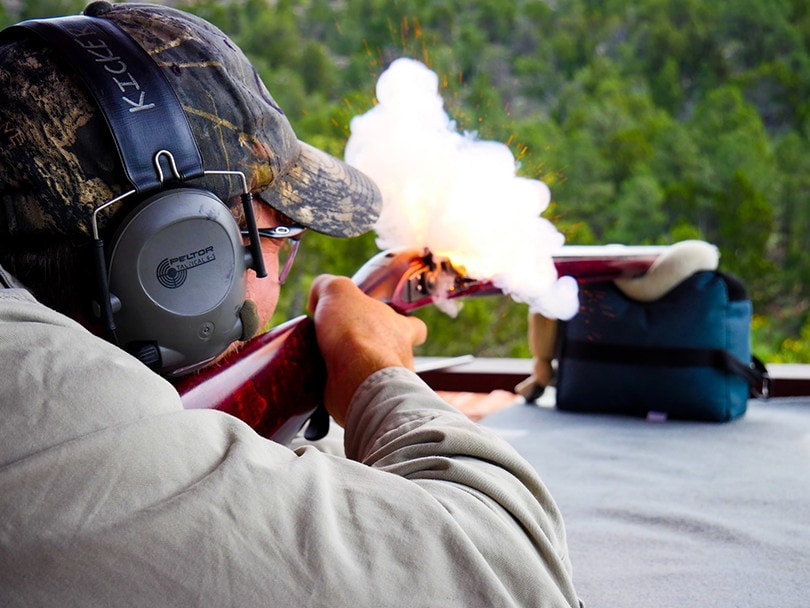How Loud Is A Gunshot? Understanding The Decibel Levels And Safety Measures
Guns are an integral part of many cultures, used for self-defense, sport, and military purposes. However, one question often arises: how loud is a gunshot? The sound of gunfire can be incredibly intense, and understanding its decibel levels is crucial for both safety and legal compliance.
Guns produce a sound that can reach staggering decibel levels, posing risks not only to hearing but also to the environment and those nearby. Knowing the exact noise levels associated with gunshots helps in making informed decisions about protective measures.
In this article, we will delve into the science behind gunshot sounds, their potential dangers, and how to protect yourself from auditory damage. Whether you're a firearm enthusiast or simply curious about the topic, this guide will provide valuable insights into the subject.
Read also:Why Did Mark Sloan Leave Greys Anatomy Exploring The Departure Of A Beloved Character
Table of Contents
- Understanding Gunshot Noise
- Decibel Levels of Gunshots
- Impact on Health
- Hearing Protection Measures
- Legal Regulations on Gunshot Noise
- Comparison with Other Sounds
- Decibel Levels of Different Firearms
- Environmental Effects of Gunshot Noise
- Safety Tips for Reducing Noise
- Conclusion
Understanding Gunshot Noise
What Happens When a Gun is Fired?
When a firearm is discharged, the explosive force propelling the bullet creates a rapid release of pressurized gases, generating a shockwave that results in a loud noise. This sound is measured in decibels (dB), which quantify the intensity of sound.
Gunshot sounds vary depending on the type of firearm, ammunition, and environmental factors. Understanding the mechanics of firearms helps in comprehending why gunshots are so loud and how they affect the surrounding environment.
Decibel Levels of Gunshots
Gunshots typically produce sounds ranging from 140 to 165 decibels. For comparison, a rock concert or a jet engine at takeoff produces around 120 dB, which is already considered harmful to hearing.
Exposure to sounds above 85 dB for prolonged periods can lead to permanent hearing loss, making gunshots particularly dangerous without proper protection.
Impact on Health
Hearing Damage from Gunshots
- Tinnitus: A ringing or buzzing sound in the ears after exposure to loud noises.
- Hearing Loss: Prolonged or repeated exposure to gunshots can result in irreversible hearing damage.
- Psychological Effects: The sudden and intense noise of a gunshot can cause anxiety or stress in individuals.
Studies have shown that even a single exposure to a gunshot without ear protection can cause temporary hearing loss, while repeated exposure can lead to permanent damage.
Hearing Protection Measures
To safeguard against the harmful effects of gunshot noise, various protective measures are available:
Read also:Lebron And Diddy Exploring The Iconic Partnership Between Two Powerhouses
- Earmuffs: These are external devices that fit over the ears and provide excellent noise reduction.
- Earplugs: Inserted into the ear canal, earplugs offer a portable and cost-effective solution for reducing noise levels.
- Electronic Hearing Protection: These advanced devices allow for normal hearing while actively reducing loud sounds, making them ideal for shooting sports.
Choosing the right hearing protection depends on individual needs and the environment in which firearms are used.
Legal Regulations on Gunshot Noise
Governments worldwide have implemented regulations to control noise pollution, including firearm noise. These laws often dictate permissible noise levels in residential areas and mandate the use of hearing protection in shooting ranges.
For example, in the United States, the Occupational Safety and Health Administration (OSHA) sets limits on noise exposure in the workplace, requiring employers to provide hearing protection for employees exposed to sounds exceeding 85 dB.
Comparison with Other Sounds
Understanding how loud a gunshot is requires comparing it to other familiar sounds:
- Normal Conversation: 60 dB
- Vacuum Cleaner: 70 dB
- Lawnmower: 90 dB
- Airplane Takeoff: 120 dB
- Gunshot: 140-165 dB
As evident from the list, gunshots are significantly louder than most everyday sounds, emphasizing the need for caution.
Decibel Levels of Different Firearms
Factors Affecting Sound Levels
Various factors influence the decibel levels of gunshots, including:
- Type of Firearm: Rifles tend to produce louder sounds than handguns due to their longer barrels.
- Ammunition: The power and composition of ammunition affect the noise produced.
- Suppressors: Also known as silencers, these devices can reduce the sound of gunshots by up to 30 dB.
For instance, a .22 caliber rifle produces approximately 130 dB, while a .50 caliber rifle can reach 165 dB or more.
Environmental Effects of Gunshot Noise
Gunshot noise not only affects human health but also has environmental implications. The loud sounds can disturb wildlife, disrupt ecosystems, and contribute to noise pollution in surrounding areas.
Research indicates that animals exposed to frequent gunfire may exhibit stress behaviors, altered communication patterns, and decreased reproductive success.
Safety Tips for Reducing Noise
Implementing the following safety tips can help mitigate the effects of gunshot noise:
- Use Hearing Protection: Always wear appropriate ear protection when handling firearms.
- Shoot in Controlled Environments: Use indoor or outdoor shooting ranges designed to minimize noise impact.
- Consider Suppressors: If legal in your area, using a suppressor can significantly reduce noise levels.
By adopting these practices, individuals can enjoy shooting activities while minimizing the risk of auditory damage and environmental disruption.
Conclusion
In conclusion, understanding how loud a gunshot is and its potential dangers is essential for anyone involved with firearms. Gunshots produce decibel levels ranging from 140 to 165 dB, which can cause immediate and long-term hearing damage if proper precautions are not taken.
We encourage readers to prioritize safety by using appropriate hearing protection, adhering to legal regulations, and considering environmental impacts. Share your thoughts in the comments below or explore other articles on our site for more information on firearm safety and noise reduction techniques.
Remember, protecting your hearing is as important as practicing safe firearm handling. Stay informed, stay safe, and let's work together to reduce the harmful effects of gunshot noise.

